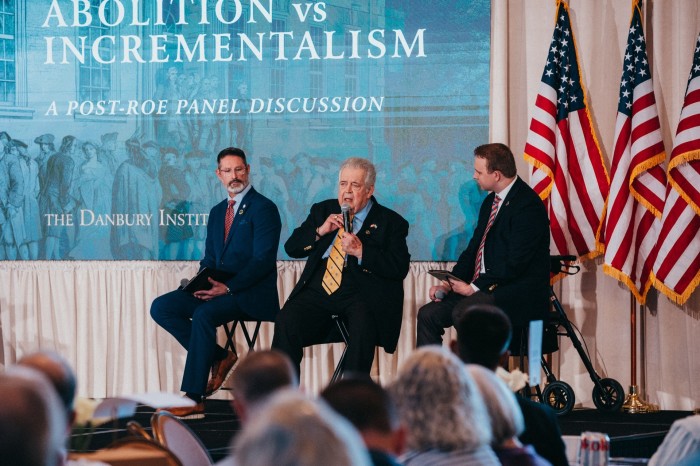
DALLAS, Texas — Should women and the men who assist them face criminal charges for getting an abortion?
That question took center stage Monday at an event hosted by The Danbury Institute on the sidelines of the Southern Baptist Convention’s Annual Meeting, which is set to run through Wednesday.
Panelists Oklahoma state Sen. Dusty Deevers, former Southern Baptist Convention Ethics & Religious Liberty Commission President Dr. Richard Land and Family Research Council’s David Closson debated three primary positions on abortion using both theological and political arguments.
Deevers, a Republican, took the abolitionist position, which essentially argues for immediate, comprehensive laws treating abortion as homicide. Advocating for equal protection under the law for preborn children from conception, Deevers pointed to the scriptures to support his stance that abortion should be treated as homicide with legal consequences for those who perform it, including mothers in cases of intentional abortion.
“The abolitionist’s position is that God’s word affirms that preborn children are full-fledged human beings created in God’s image, and for the purposes of the 14th Amendment, they are people,” said Deevers, a pastor at Grace Reformed Baptist Church of Elgin, Oklahoma.
In fact, for Deevers, the abolitionist position is the only one consistent with the Bible, particularly the Ten Commandments. “Biblically speaking, to abolish abortion is to consistently apply the sixth commandment to our preborn neighbors’ lives,” he said. “‘You shall not murder.'”
Deevers opposes incrementalism as unbiblical and ineffective, claiming it perpetuates abortion by allowing exceptions and failing to deter self-managed abortions via pills.
“The hard truth is that the mother who willfully ingested the pill to murder her own child is the only remaining party left to prosecute under state law,” said Deevers. “If you grant her blanket immunity, then abortion is legal.”
Both Closson and Land, however, each took opposing views.
Closson argued in favor of what he coined “smash-mouth incrementalism,” while Land, who is CP’s executive editor, held to an incrementalist perspective with a long-term abolitionist goal.
“I have been, I will continue to be for a human life amendment to the Constitution of the United States that grants the same protections under the law that we granted to slaves after the Civil War, full citizenship from conception to natural death,” said Land.
However, he argued, the political reality of a divided electorate makes the likelihood of reaching total abolition in the short term unlikely.
“If we insisted to have the abolition of all abortion and criminalization of all abortion everywhere in the country, we would get zero because we live in a democracy,” added Land.
Citing incremental legislation like heartbeat bills and ultrasound requirements, Closson said such laws are effective and politically feasible, given the pro-choice majority in the U.S.
He also cited the impact of the courts overturning Roe v. Wade in 2022.
“In the year after Roe was overturned, abortions occurring within the healthcare system decreased. … Arkansas, total abortions down 48%, chemical abortion down 68%. In Ohio, abortion down 15%. North Dakota abortion down 34.6%.”
He largely agreed with Land’s political assessment.
“The sad reality is the majority of our fellow citizens are pro-abortion,” said Closson, who serves as the Director of the Center for Biblical Worldview at Family Research Council, a Christian conservative advocacy organization. “As pro-lifers, the regrettable reality is that we are a political minority.”
Deevers argued that incremental laws, like heartbeat bills, fail to reduce abortion numbers and instead “catechize the culture” to accept abortion through legal loopholes, citing increased abortion rates due to mail-order pills.
“The abortion numbers in Texas are far greater now due to the abortion bill because they’ve shifted,” he said. “We have just catechised them to make an impulse buy.”
He also pointed to the failure of pro-life laws — such as those in Texas, which allow doctors to perform an abortion if they believe the mother’s life is at risk — to stem the tide of abortion since the Dobbs decision. “Pro-life immunity laws are the biggest reason why abortion numbers have not decreased at all since the overturn of Roe v. Wade,” Deevers said.
The debate underscored perhaps the greatest controversy in the abolitionist position, which calls for the prosecution of anyone involved in an abortion — from mother and partner to physicians and other medical staff. Land said the notion of prosecuting women who have an abortion overlooks the conditions in which a pregnant woman decides to do so.
“Every woman I know who’s had an abortion … is a victim,” Land said. “It is an unnatural act for a woman to kill her unborn baby.”
Ultimately, Deevers agreed with Land that laws should protect women who are coerced into ending a pregnancy but argues that equal protection laws would also hold men accountable as accomplices.
“A bill of equal protection would provide the woman who is coerced … protection for her life,” he said. “He would be tried, she would not.”


















